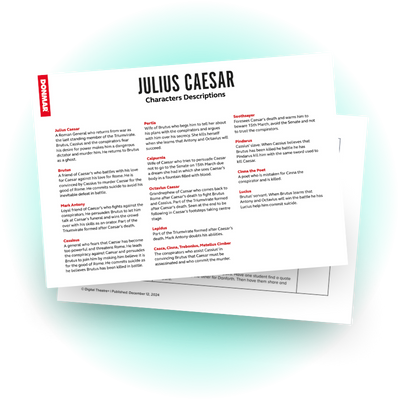Teach Julius Caesar
Based on the real-life assassination of Julius Caesar (Roman General, Statesman, and Dictator) in 44 BCE, William Shakespeare's five-act play was first performed in 1599, and is one of his 12 tragedies.
- What is Julius Caesar about?
- What are the key themes and characters?
- Why did Shakespeare write Julius Caesar?
Digital Theatre+ helps you bring Julius Caesar to life in the classroom with high-quality productions, lesson plans, interactive resources, and more...
Julius Caesar (Royal Shakespeare Company) | © Helen Maybanks
Explore Julius Caesar on Digital Theatre+
- 4Productions
- 25Video resources
- 9Written resources
Light up your classroom with engaging resources made by teachers, for teachers. Get in touch for a complete overview.
|
|
The RSC, 2017 Digital Theatre captured this production live in Stratford-Upon-Avon at the Royal Shakespeare Theatre. "This production is a classic study of the dangers of division among opponents of unbridled authority." – The Guardian ★★★★
|
|
|
Donmar Warehouse, 2012 The first production in the Donmar's Shakespeare Trilogy, Phyllida Lloyd's award-nominated all-female production sees Harriet Walter take on the role of Brutus. "Lloyd's ferocious cast quietly underline her points with joyously unquiet performances." – Vulture
|
|
|
Illuminations, 2012 Gregory Doran relocates Shakespeare's tale of power and corruption to post-independence Africa. Featuring an entirely Black British cast, this production was filmed live in Stratford-upon-Avon. "Doran's production gives the play's central debate about the necessary political murder a new immediacy." – The Guardian ★★★★
|
|
|
L.A. Theatre Works, 1994 Recorded before a live audience at KCRW Studios, Shakespeare's tragedy is performed by an all-star, all-American cast, including Richard Dreyfuss as Mark Antony, Stacy Keach as Brutus, and Bonnie Bedelia as Calpurnia.
|
Interviews & Documentaries
- An Introduction to Julius Caesar
- Harriet Walter on Brutus
- The Making of Julius Caesar
E-learning Videos
- Unlocking Character: Brutus
- Unlocking Language and Literary Devices in Julius Caesar
- Unlocking Rhetoric in Julius Caesar
Essays
- Donmar Shakespeare Trilogy: A Critical Introduction
Study Guides
- Spotlight On: Shakespeare's Soliloquies
- Director's Notebook: Julius Caesar
- Unlocked: Julius Caesar
Julius Caesar Lesson Plans
- Exploring the Director's Process
- Julius Caesar: Education Pack
- Exploring All Female Casting

What is Julius Caesar about?
44 BCE. As Rome's empire grows across the globe, it becomes harder to control, and Roman officials begin to argue with their military leaders, while the lower classes grew frustrated by the rich upper classes, feeling their voices go unheard.
In the midst of this, Gaius Julius Caesar rises the military ranks, and eventually forms the First Triumvirate with Pompey the Great and Crassus. After Crassus dies in battle, a civil war breaks out and Caesar emerges the victor.
Shakespeare's play follows the period where senators began to worry that Caesar was becoming a tyrant, and finally plotted to assassinate him on the Ides of March.
Explore Key Themes & Characters
Turn passive learning into active engagement with fun and dynamic resources on core literary texts like Julius Caesar, including in-depth analysis of key themes, characters, and literary techniques. Explore the full DT+ library with a free trial.
Key Themes
In Elizabethan England, people felt they were at the mercy of fate. They believed that who you were, who you would become, and what would happen to you could all be predicted by studying the planets and stars.
As a result, many people were unsure of what they could change about their lives. Did God and the stars predict everything? Did you really have free will? Could you ever really change your own destiny?
Julius Caesar does not shy away from issues of fate and free will.
Honor was incredibly important in Elizabethan England. An honorable man was considered to be brave, powerful, successful, and loyal. He would come from a family with a 'good' name, and he would have a strong military record.
Honor is an important theme in Julius Caesar - after all, it's for honor's sake that Brutus decides to join in Caesar's assassination.
Shakespeare loves to use the supernatural in his plays as a way of showing that his characters are in trouble, that they have done something evil, or that they are going to die.
In Julius Caesar, the supernatural has a very early role. In Act 1 Scene 2, a Soothsayer appears and warns Caesar to "Beware the Ides of March".
Key Characters
"I am as constant as the northern star, of whose true-fix'd and resting quality there is no fellow in the firmament." (Caesar, Act 3 Scene 1)
Caesar is a military hero, a member of Rome's First Triumvirate, and an Emperor of Rome.
Caesar's greatest flaw is considered to be his ambition and pride. He is also far too easily manipulated by flattery, and in the moments before his death, he shows that he is capable of cruel authority.
"I'd rather be a dog, and bay a the moon, than such a Roman." (Brutus, Act 4 Scene 3)
Brutus is a praetor, a judicial magistrate in Rome. Initially, he is a close friend of Julius Caesar, but as he begins to fear Caesar's potential to become a tyrant, he decides to betray Caesar.
Brutus is idealistic and believes in the greater good of Rome, but he does not realize he is being manipulated by Cassius through flattery, forgery, and other subtle methods.
"For I know / When thou didst hate [Caesar] worst, thou lovest him better / Than ever thou lovedst Cassius." (Cassius, Act 4 Scene 3)
The play's antagonist (and a foil to Brutus), Cassius is a senator of Rome. He is good at reading people and determining their true intentions, and these skills pose a direct threat to Caesar, who would rather have politicians who were too distracted to see his true ambition.
Cassius tricks Brutus into joining the conspiracy, forging several 'anonymous' letters that appeal to Brutus's nobility, honor, and devotion to the Roman Republic.
This overview is taken from our Unlocked Study Guide, which covers key context, characters, themes, and literary devices of the text.
Why did Shakespeare write Julius Caesar?
In 1599, Elizabeth I had been Queen of England for over 40 years, and while she was well liked by the English citizens, she had some Caesar-like traits. She directly appointed people in her closest circle to the House of Commons, and like Caesar, she showed no signs of appointing a successor.
Shakespeare had to tread carefully when it came to what he wrote, which is probably why he never wrote about the monarchs of his day, and instead, drew comparisons between current politics and long-dead rulers of the past.
Extract: Unlocked Study Guide: Julius Caesar on DT+.
Making Shakespeare Cool | On-Demand Webinar
Get access to panel discussions, live teaching demonstrations, and ready-to-use lesson plans all designed to help you make Shakespeare's works and language more accessible (and fun!).














